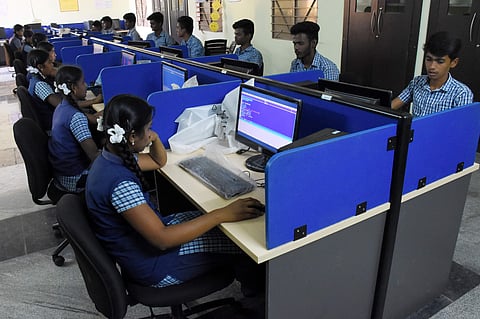

Enrollment of children in Karnataka's government schools has leaped from 68.6 per cent to 77.7 per cent over the last year, according to the latest Annual Status of Education Report (ASER) survey, released on Wednesday.
The survey aims to capture the transition in the education system in the country as the Covid-19 pandemic shows signs of receding. However, the number of children taking private tuition has also increased in the state. According to the ASER survey, done from 890 villages across 30 districts in Karnataka, 77.7 per cent of children (76.8 per cent boys and 78.6 per cent girls) have enrolled in government schools in 2021, up from 68.6 per cent in 2020 and 69.4 per cent in 2018.
As many as 76,606 households in 17,814 villages were covered under the survey of which 4841 households in Karnataka were surveyed. Educationists from Karnataka said there has been a dramatic rise of almost 8.3 per cent which is a relief. On the other hand, the enrollment in private schools in the country has dipped, for the first time in recent years, from 28.8 per cent in 2020 to 24.4 per cent in 2021. "There could be many reasons behind the rise in enrollment in government schools. Families have suffered economic distress during the pandemic and the cost of living is going up. During the pandemic, many affordable private schools shut too. Teachers have shifted professions after private schools shut down. CSR activities and helping in government schools for better infrastructure and teachers in government schools are much professionally qualified, these are some of the reasons. The government is also starting English medium schools. Many migrant families moved back to villages too," Prof B R Gopal, Principal Retd, Teachers College told TNIE.
Interestingly, D Shashikumar general secretary of a state-wide association of private school KAMS says this pattern is reversing and many children who indeed went to government schools during the pandemic are coming back to private schools. He says, "Yes, there were many students who shifted. Financial issues of many parents, government allowing enrolment without Transfer Certificate (TC), migration were some reasons. But the scenario has changed now after the ASER survey. In the last one month, instead, there is a reversal that is happening. From government schools they are coming back —either to the same school or other schools also," he said.
He also explains that several students who moved to government schools found that there was no English Medium and the medium of instruction was in the local language questioning the quality of education there. He said that there needs to be intervention from the government to also ensure that parents send their children back to school as the overall admissions has dipped in primary and pre primary levels. Meanwhile, the ASER report also says that time will reveal if these patterns constitute a transitory phase, as schools reopen across states or whether they become a permanent feature of schooling in rural India.
Dependency on tuition classes gone up?
In Karnataka, the trend of more students depending on tuition classes has risen to 20.5 per cent from 8.4 per cent. Interestingly, in the previous survey done in 2020, the number had come down from 10.7 in the 2018 survey to 8.4 in 2020.
The report says that this is seen as a natural outcome of families seeking external support due to the prolonged closure of schools. "Several families, including those who had parents who are both educated have resorted to supplementary classes showing that several parents may either be feeling insecure about the education of their child and want extra classes for their child or that the families could not provide them support. It is seen that students had resorted to coaching or tuition irrespective of classes or type of school (government or private). Both heavily relied on tuition," said Dhananjaya Ramarao, principal of a private school.
While educated parents found it difficult too, the majority of children from disadvantaged households also took tuitions. As kids turned towards family support during the COVID-led school shutdown, first-generation learners or those whose parents had 'low' education qualifications, found it hard to keep up with online students, said the report. "It is curious that while economic disruptions may have moved children out of private schools, parents were still able to access tuition classes where they had to pay fees," states ASER.
